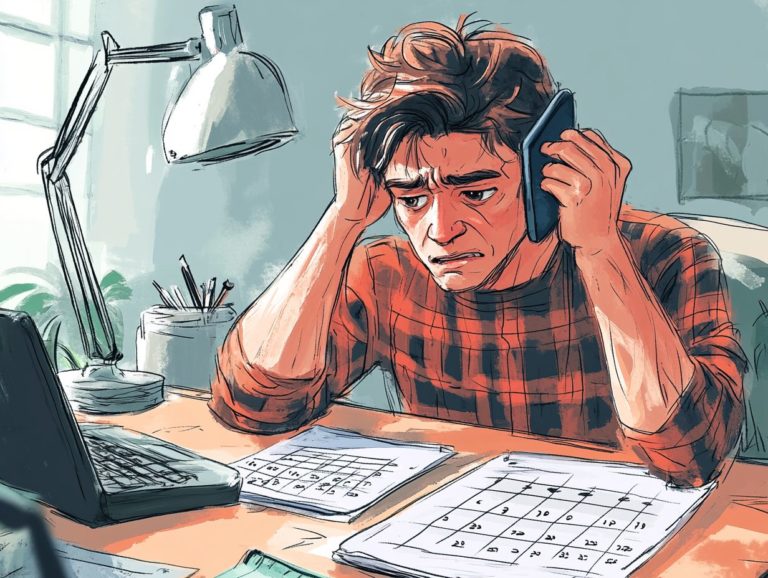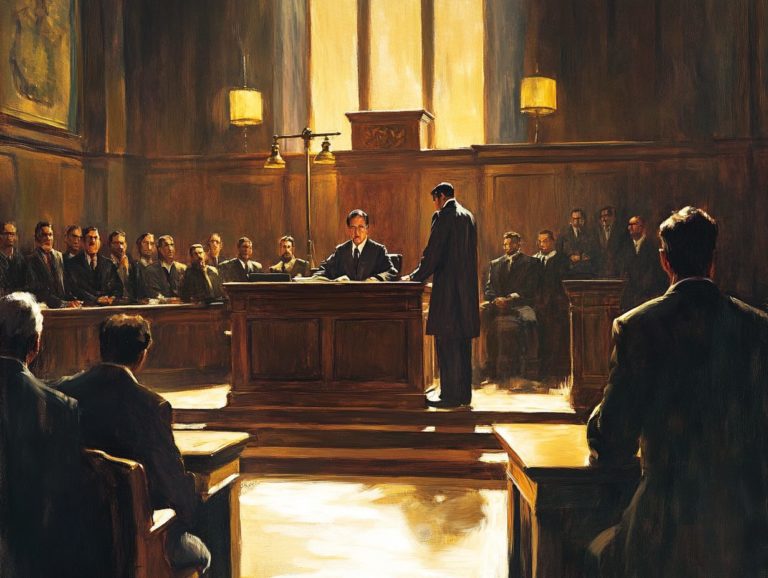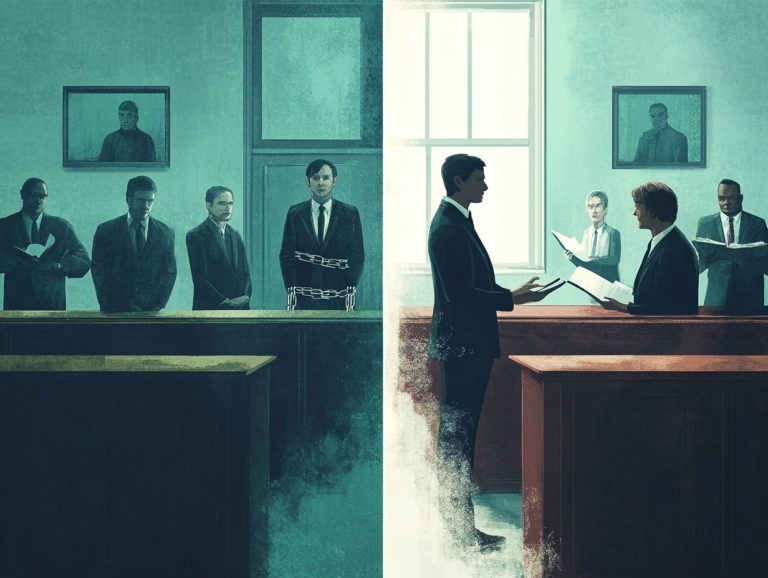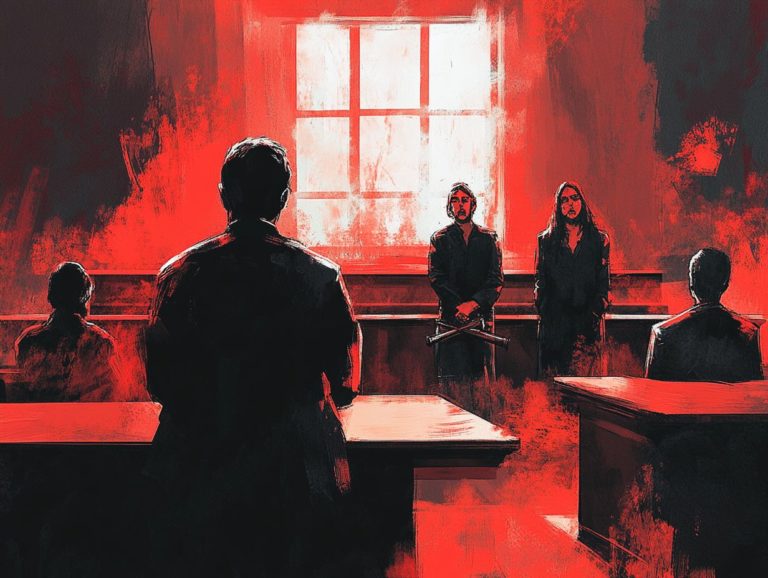What Are the Consequences of a Criminal Record?
Criminal records can significantly shape your life, influencing everything from job prospects to housing availability. You may not fully grasp how deeply a record can affect your daily experiences, including restrictions on travel and eligibility for financial aid.
Fortunately, you can lessen these effects through pathways such as removing a criminal record and rehabilitation programs. Knowing your legal rights can empower you to overcome challenges from the outset.
This article delves into these topics thoroughly, offering insights on how to navigate a world where a criminal record can present considerable obstacles.
Contents
- Key Takeaways:
- Understanding Criminal Records
- Consequences of Having a Criminal Record
- Ways to Overcome the Consequences
- Preventing a Criminal Record
- Frequently Asked Questions
- How can a criminal record affect my life?
- What types of employment opportunities may be affected by a criminal record?
- How does having a criminal record impact your ability to travel?
- What rights may be affected by a criminal record?
- Can I remove or hide my criminal record?
- How can I lessen the impact of a criminal record?
Key Takeaways:
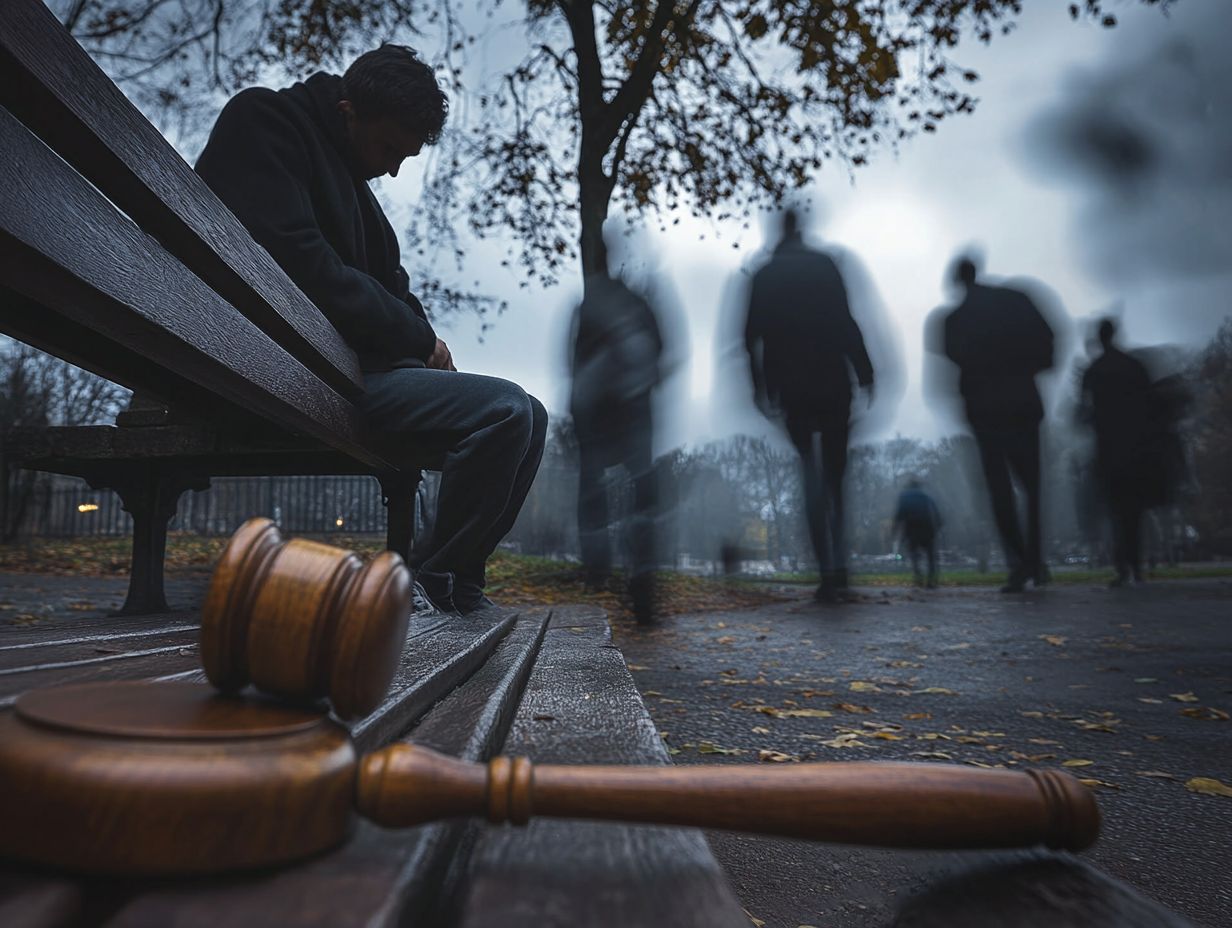
- A criminal record can majorly impact your future employment opportunities, making it difficult to find a job and provide for yourself or your family.
- It can also lead to challenges in finding housing and receiving financial aid, limiting access to stable living situations and higher education.
- You can overcome the consequences of a criminal record through options such as removal, rehabilitation programs, and understanding your legal rights and responsibilities.
Understanding Criminal Records
Understanding criminal records is crucial for tackling the systemic issues tied to mass incarceration in the United States, particularly in cities like Philadelphia and states such as North Carolina and California. These records can dramatically shape your opportunities, influencing everything from landing a job to securing financial aid and even affecting child custody and immigration status.
By gaining a comprehensive understanding of the types of criminal records, their implications for civil rights, and the services available to clear records, you can take charge of the record clearance process.
A criminal record impacts many areas of life, creating significant hurdles to employment and perpetuating a cycle of disadvantage, especially for marginalized communities.
Definition and Types of Criminal Records
Criminal records encompass various documents, including arrest records, conviction records, and disposition records, each reflecting your interactions with the legal system.
These records detail instances when law enforcement became involved in your life whether through an arrest, subsequent charges, or final outcomes in court shaping your legal history.
Arrest records are generated when law enforcement detains you based on suspected criminal activity. Conviction records signify the formal judgments made after a trial or plea agreement, while disposition records capture the ultimate resolution of your case, such as acquittals or sentences imposed.
The legal implications of these records extend far beyond simple documentation; they can significantly impact your civil rights, affecting everything from employment opportunities to housing applications and even social relationships.
Society often stigmatizes individuals with criminal records, creating hurdles for reintegration into the community and perpetuating biases that can lead to ongoing cycles of disadvantage.
Consequences of Having a Criminal Record
The consequences of holding a criminal record extend well beyond the immediate legal implications. It profoundly impacts your employment prospects, complicates your ability to secure housing, and creates hurdles when seeking financial aid or exercising your voting rights.
In the landscape of mass incarceration, especially in the United States, those with a criminal record often face severe reputational damage and increased scrutiny from landlords, leading to significant obstacles in achieving stable living conditions.
This challenge is particularly acute in Black and Latino communities, where the stigma surrounding a criminal record can obstruct paths to rehabilitation and reintegration into society.
For more information about your rights and resources available, consider exploring the options for assistance in overcoming the challenges presented by a criminal record.
Impact on Employment Opportunities
A criminal record can limit your job prospects. Many individuals face big challenges in overcoming this issue.
Employers may link a criminal history with unreliability, overlooking your skills and qualifications.
Some industries have legal restrictions that disqualify applicants with certain past offenses, regardless of how much time has passed.
Civil rights laws aim to stop discrimination in hiring, but enforcement can vary. Organizations like the National Employment Law Project work hard to promote fair hiring practices and help individuals with records find jobs.
Effects on Housing and Financial Aid
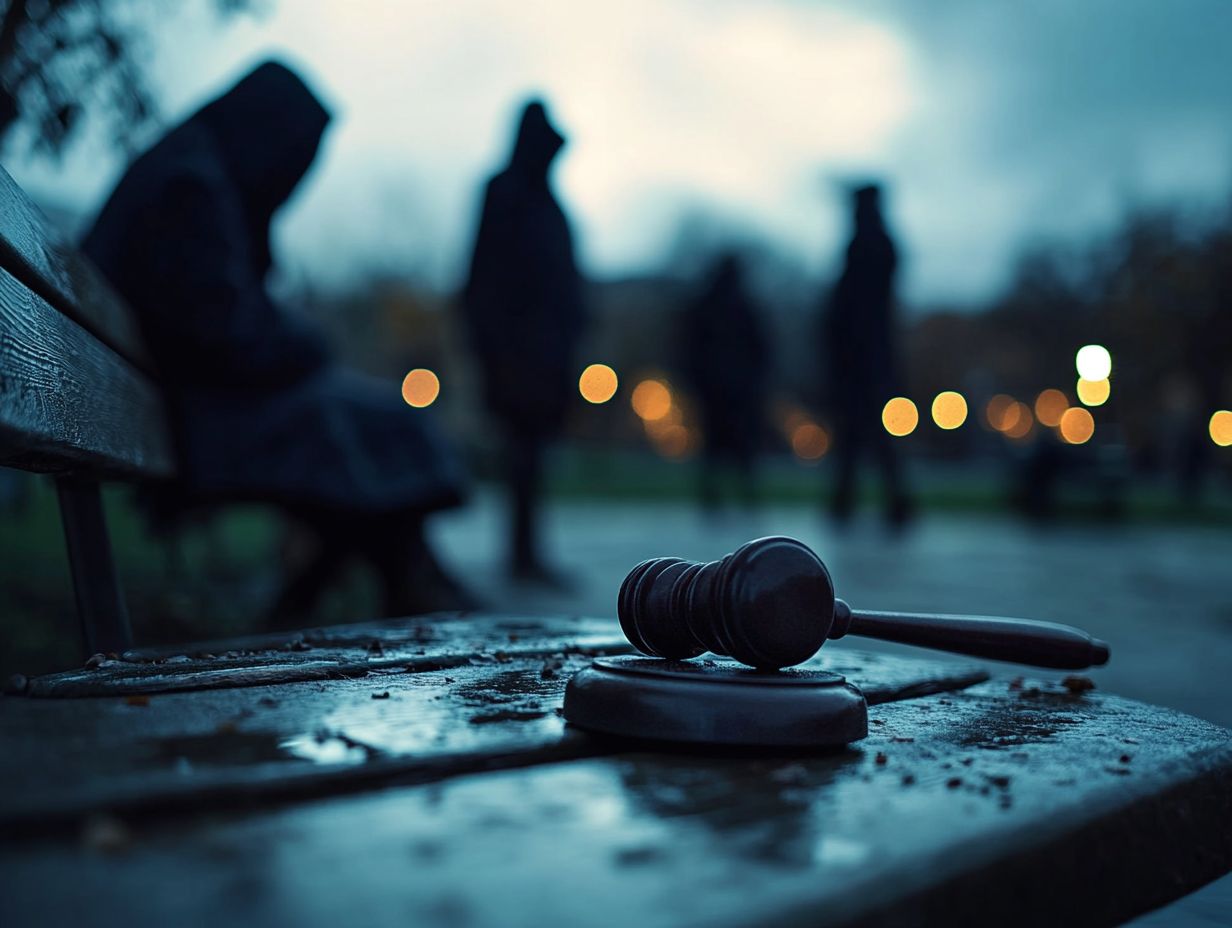
A criminal record can complicate your housing options. Many landlords conduct background checks that reveal past offenses and raise concerns.
This scrutiny increases the chances of being disqualified from housing, making it harder to find a stable place to live.
A criminal history can also affect your eligibility for financial aid, limiting your educational opportunities.
The stigma can damage your reputation and restrict access to resources, making reintegration more difficult.
Limitations on Travel and Other Activities
People with criminal records face limitations on travel and participation in activities due to legal restrictions.
These restrictions can affect both domestic and international travel, leading to increased scrutiny at borders.
Some jobs require licenses that may be unattainable because of past offenses, further limiting career growth.
These barriers can infringe on your civil rights and prevent full participation in society.
Ways to Overcome the Consequences
To tackle the challenges of a criminal record, consider expungement services and rehabilitation programs. These steps can help clear your record and restore your rights.
Expungement and Pardon Options
Expungement and pardon options are pathways to clearing your criminal record. These legal processes allow eligible individuals to remove past offenses from public records, opening doors to jobs and housing.
To qualify for expungement, you usually need to meet certain criteria, like completing your sentence and staying crime-free for a specified time. Obtaining a pardon requires a thorough review of your character and rehabilitation efforts.
Many people have successfully used these options to transform their lives. Imagine a former offender finding stable employment and positively impacting their community. This shows how clearing a record can change lives for the better.
Rehabilitation and Reintegration Programs
Rehabilitation and reintegration programs are vital in aiding individuals with criminal records as they seek to reintegrate into society and reclaim their civil rights. These programs offer essential resources, including job training, counseling, and educational opportunities, all of which foster a sense of belonging and purpose.
By tackling the underlying issues that often contribute to criminal behavior, these programs significantly decrease the likelihood of reoffending. Social workers and legal advocates play a key role in this journey; they connect you with available resources and ensure your civil rights are protected throughout the reintegration process.
Through the collaborative efforts of these professionals, you are enabled to build a new, productive life. This supports you in making meaningful contributions to your community.
Preventing a Criminal Record

Preventing a criminal record is essential for many individuals. It demands a thorough understanding of legal rights and responsibilities.
Grasping these concepts helps you navigate potential pitfalls confidently and safeguard your future.
Avoiding Criminal Activities
One of the most effective ways to prevent a criminal record is by actively steering clear of criminal activities. Understanding the underlying factors that contribute to such behaviors is also crucial.
Education plays a vital role in this prevention landscape. It equips you with the knowledge and skills necessary to make informed choices.
Prioritizing community engagement allows local programs to support at-risk individuals. This provides them with a sense of belonging and purpose.
Fostering strong support systems whether through family, friends, or community organizations can significantly diminish the temptation to engage in unlawful activities.
It s important to recognize that factors like poverty and lack of good schools often push individuals toward crime.
By addressing these challenges through targeted interventions, communities can cultivate an environment that deters crime and uplifts individuals. This offers them the hope and resources needed to pursue a more positive path.
Understanding Legal Rights and Responsibilities
Understanding your legal rights and responsibilities is essential for preventing a criminal record and ensuring fair treatment within the justice system. Recognizing these rights during interactions with law enforcement can significantly shape the outcome of such encounters.
Your right to a fair trial and legal representation is paramount in court proceedings. Being well-informed is crucial.
Awareness of your employment rights can shield you from discrimination and wrongful termination based on factors unrelated to your job performance.
Educational programs offered by civil rights organizations are invaluable. They equip you with the tools necessary to advocate for yourself and navigate the complexities of the legal landscape effectively.
Frequently Asked Questions
How can a criminal record affect my life?
Having a criminal record can result in a variety of negative consequences. It can affect your personal and professional life, including difficulty finding employment, restrictions on certain rights and privileges, and a social stigma that impacts relationships and opportunities. For more information, you can explore the impacts of a criminal conviction.
What types of employment opportunities may be affected by a criminal record?
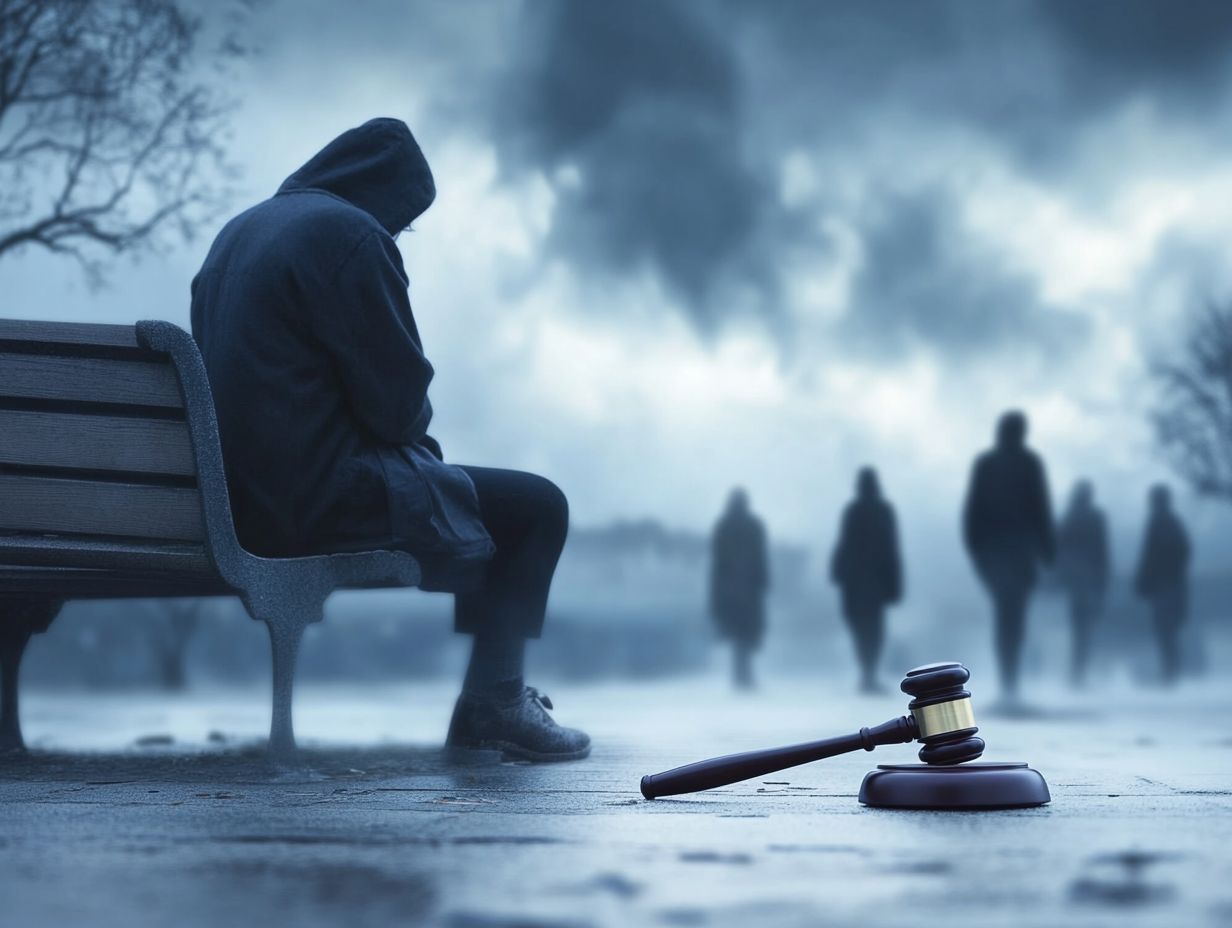
A criminal record can make it difficult to secure employment, especially in fields that require background checks. This includes positions in government, healthcare, education, and law enforcement, particularly those involving vulnerable populations.
How does having a criminal record impact your ability to travel?
Having a criminal record can make traveling difficult, particularly internationally. Some countries may deny entry or require additional documentation, making travel more challenging and expensive.
Certain criminal convictions may restrict your ability to obtain a passport.
What rights may be affected by a criminal record?
A criminal record can take away your voting rights and make you ineligible for jury duty. It can also limit your ability to own a gun and secure housing, financial aid, or professional licenses.
Can I remove or hide my criminal record?
You might be able to remove or hide your criminal record. This means destroying it or making it unavailable to the public. The process depends on your state and the seriousness of the offense.
How can I lessen the impact of a criminal record?
If you have a criminal record, there are ways to lessen its effects. Consider getting legal help or joining programs that assist with personal development. Some employers may overlook certain offenses if they see you re actively working on improving yourself.


